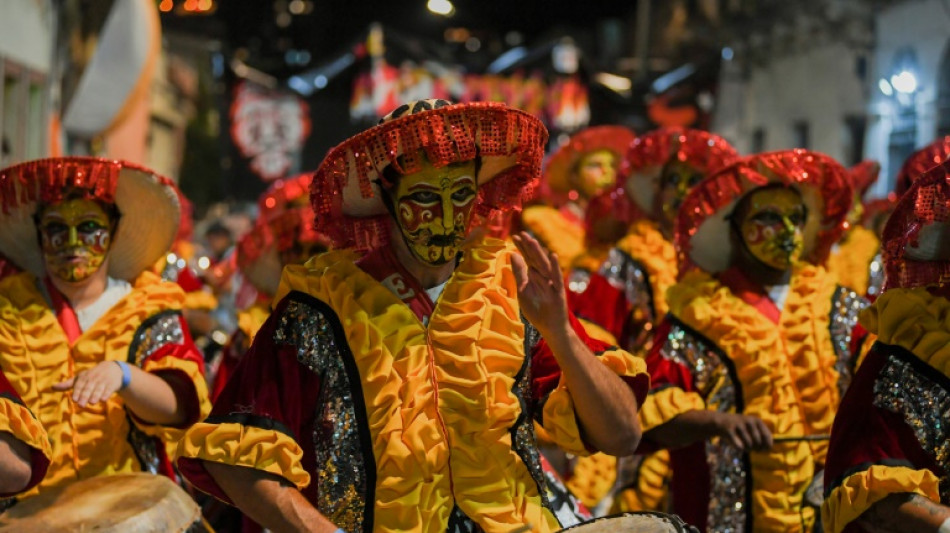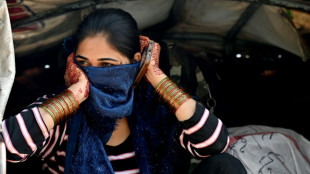
-
 South Korea's Ryu and Japan's Saigo share LPGA Chevron lead
South Korea's Ryu and Japan's Saigo share LPGA Chevron lead
-
Canada leaders make closing pitches in campaign upended by Trump

-
 De Bruyne's Man City exit 'so difficult' for Guardiola
De Bruyne's Man City exit 'so difficult' for Guardiola
-
'No regrets' for Amorim over Man Utd move

-
 Lyon and Strasbourg win to close in on Europe, Montpellier relegated from Ligue 1
Lyon and Strasbourg win to close in on Europe, Montpellier relegated from Ligue 1
-
Toulouse thrash Castres as Top 14 pursuers stumble

-
 Djokovic crashes to nervous Arnaldi in Madrid opener, Swiatek advances
Djokovic crashes to nervous Arnaldi in Madrid opener, Swiatek advances
-
Olympic champs Russell, Davis-Woodhall win at Drake Relays

-
 Browns end Sanders long draft slide
Browns end Sanders long draft slide
-
Cavs crush Heat, on brink of NBA playoff sweep

-
 Fire rages after major blast at Iran port kills 8, injures hundreds
Fire rages after major blast at Iran port kills 8, injures hundreds
-
Kiwi Beamish wins Penn Relays 1,500m crown with late kick

-
 Mbappe on Real Madrid bench for Clasico Copa del Rey final
Mbappe on Real Madrid bench for Clasico Copa del Rey final
-
England survive France fightback to seal Women's 6 Nations slam

-
 Palace sweep past Villa to reach FA Cup final
Palace sweep past Villa to reach FA Cup final
-
CAF appoint Moroccan Lekjaa first vice-president

-
 Major blast at Iran port kills 5, injures hundreds
Major blast at Iran port kills 5, injures hundreds
-
Rodgers vows to stay with Celtic after fourth successive Scottish title

-
 Ipswich relegated as Newcastle, Chelsea boost top five bids
Ipswich relegated as Newcastle, Chelsea boost top five bids
-
Canada leaders make final pitches in campaign upended by Trump

-
 Mullins -- Ireland's national training treasure
Mullins -- Ireland's national training treasure
-
US, Iran say progress in 'positive' nuclear talks

-
 Mullins emulates O'Brien with second successive trainer's title
Mullins emulates O'Brien with second successive trainer's title
-
Ipswich relegated after one season in Premier League

-
 Just Stop Oil activist group holds final march
Just Stop Oil activist group holds final march
-
Djokovic crashes to nervous Arnaldi in Madrid opener

-
 Syria's Kurds demand 'democratic decentralised' Syria
Syria's Kurds demand 'democratic decentralised' Syria
-
Leverkusen win to delay Bayern and Kane's title party

-
 Buenos Aires farewells native pontiff with tears and calls to action
Buenos Aires farewells native pontiff with tears and calls to action
-
Turkey's opposition says Erdogan's canal plan behind latest arrests

-
 Maresca hails 'nasty' Chelsea as top five bid stays alive
Maresca hails 'nasty' Chelsea as top five bid stays alive
-
Trump raises Putin doubts after Zelensky talks at pope's funeral

-
 Major blast at Iran port kills 4, injures hundreds
Major blast at Iran port kills 4, injures hundreds
-
Napoleon's sword to be sold at auction in Paris

-
 Iran, US discuss nuclear deal in third round of talks
Iran, US discuss nuclear deal in third round of talks
-
Buenos Aires farewells native pontiff with call to action

-
 Warholm sets hurdles world record at Diamond League, Holloway shocked
Warholm sets hurdles world record at Diamond League, Holloway shocked
-
US students 'race' sperm in reproductive health stunt

-
 Wikileaks founder Assange joins crowds for pope funeral
Wikileaks founder Assange joins crowds for pope funeral
-
Leader Marc Marquez claims Spanish MotoGP sprint victory

-
 Celtic win fourth successive Scottish Premiership title
Celtic win fourth successive Scottish Premiership title
-
Jackson ends drought as Chelsea boost top five push

-
 Warholm sets 300m hurdles world record in Diamond League opener
Warholm sets 300m hurdles world record in Diamond League opener
-
Major blast at south Iran port kills 4, injures hundreds

-
 Russia says retook Kursk from Ukraine with North Korean help
Russia says retook Kursk from Ukraine with North Korean help
-
Francis laid to rest as 400,000 mourn pope 'with an open heart'

-
 Trump, Zelensky meet on sidelines of pope's funeral
Trump, Zelensky meet on sidelines of pope's funeral
-
'Shared loss': Filipino Catholics bid Pope Francis farewell

-
 Families unable to reunite as India-Pakistan border slams shut
Families unable to reunite as India-Pakistan border slams shut
-
Major blast at south Iran port injures hundreds


Las Llamadas: Uruguayan festival born from African struggle
As a little boy, Cesar Pintos -- now 86 -- played "drums" with his friends in the streets of Montevideo's black-majority neighborhoods, beating tin cans with twigs to ancestral rhythms brought to Uruguay by enslaved Africans.
It was the 1940s, barely 100 years since the abolition of slavery in the South American country and a period of explosive growth for candombe -- a uniquely AfroUruguayan music style.
"Black people brought it here," Pintos told AFP of the music, which UNESCO recognized as a piece of Uruguayan cultural heritage "transmitted within families of African descent."
"They brought it in their heads, because they had nothing" in the line of possessions, said Pintos.
As an adult, he started his own "comparsa" of drummers and dancers from his Cordon neighborhood, one of the birthplaces of candombe.
The group, named Sarabanda, participates to this day in "Las Llamadas" -- an annual parade hailed as a celebration of African heritage and the highlight of Montevideo's carnival.
Las Llamadas translates as "The Calls," from the ancient practice of beating drums to "call" the community together.
Every year since 1956, dozens of comparsas march in the Montevidean city center with painted faces and elaborate costumes that hark back to a distant past on a foreign continent.
In a two-day carnival competition watched by thousands, they beat out candombe tunes on wood and animal skin drums as the performers dance.
- From 'objects' to musical stars -
Today, Las Llamadas is a celebration for all race groups -- in fact many comparsas are majority white.
But the origins of candombe music are found in black struggle.
Montevideo was an important entry port for enslaved Africans brought by Europeans to South America from the second half of the 18th century.
By the end of the 1700s, over a third of the capital's population were African descendents, according to the municipal website.
For generations of enslaved people and their offspring, drumming and dancing in their free time was a way to hold on to distant ties to the mother continent.
When slavery was abolished in Uruguay in the mid 19th century, AfroUruguayans created mutual aid societies, whose lively meetings gave birth to candombe.
- 'Fundamental' -
"The drum for us is fundamental... It allows us to protest when we need to make ourselves heard, and also to have fun," Alfonso Pintos, the 59-year-old son of Cesar, told AFP.
He pointed to the role of comparsas in drumming up Uruguayan resistance to apartheid in South Africa, and closer to home, the country's own military dictatorship of the 1970s and 1980s that displaced many black Montevideans.
Today, Las Llamadas is more party than protest, but the fight for equality is not over.
According to the World Bank, Uruguay stands out in Latin America for its low level of inequality, though black people are more likely to be poor.
The last inequality report by the government's INE statistics institute reported in 2014 that more than half of Afrodescencents did not have their basic needs met, compared to less than a third of whites.
Nine in ten AfroUruguayans aged 20 to 24 do not obtain a tertiary education.
- True to its roots? -
Just over 255,000 people out of about 3.2 million Uruguayans identified as Afrodescendents in the last census.
It is a shrinking ratio of the population -- about 8.0 percent compared to more than a third 200 years ago.
"Uruguay really took very seriously the idea of trying to become a white nation," mainly by encouraging European migration, said historian George Reid Andrews, author of the book "Blackness in the White Nation."
For many AfroUruguayans, candombe is a cherished inheritance.
Alfonso Pintos, a woodworker by trade, has taken over Sarabanda from dad Cesar, who still makes guest appearances with the troupe.
Cesar's grandson Pablo, 34, is the drumming coordinator and granddaughter Micaela, 29, the lead dancer.
Seven-year-old Catalina, Cesar's great-granddaughter, is already preparing to become a fourth generation performer.
But some feel candombe is no longer true to its roots.
Tomas Chirimini is president of the Africania civic association and leader of the performing troupe Conjunto Bantu, which does not participate in Las Llamadas or carnival.
"The black (Uruguayan) has lost a place to express his heritage," Chirimini, 84, told AFP, referring to what he perceives as a creeping commercialization and watering-down of AfroUruguayan culture.
Things are indeed changing, said 34-year-old Fred Parreno, a Sarabanda drummer.
But "the fundamental thing is... to be aware of what you are representing when you pick up a drum," he told AFP.
"You are representing many people who came before and who spilled their blood so that today we can walk on the street" drumming, he said.
O.Johnson--AMWN



